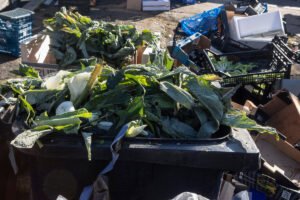Tuesday, 17 February 2026
From Plate to Planet: How Sustainable Gastronomy Is Redefining Food Values
Christian Philippsen, Managing Director, BENEO, Asia Pacific Gastronomy today is no longer defined solely by flavour or presentation—it’s shaped by purpose. Once the domain of fine dining and culinary artistry,…

Christian Philippsen, Managing Director, BENEO, Asia Pacific
Gastronomy today is no longer defined solely by flavour or presentation—it’s shaped by purpose. Once the domain of fine dining and culinary artistry, gastronomy is evolving to reflect growing consumer awareness around sustainability, provenance, and nutrition.
As food choices become a mirror of personal ethics, consumers around the world are reflecting deeper: How was my food grown? Who produced it? What’s its environmental footprint? These questions mark a turning point in how we define quality, trust, and sustainability in our diets.
Not confined to restaurants or kitchens, this shift is influencing how brands across the food industry rethink their role in building a healthier planet. In recognition of Sustainable Gastronomy Day, we explore how trends within gastronomy are inspiring wider innovation in food manufacturing—from ingredient sourcing to processing—and how producers are quietly driving change behind the scenes to meet the demands of a more resilient and responsible food system.
Rethinking Ingredients: From Functional to Future-Proof
Plant-based eating is rapidly gaining mainstream traction, driven by flexitarians and health-conscious consumers seeking options that benefit both personal health and the planet. Traceable, minimally processed, and responsibly grown ingredients are becoming essential. In the Asia-Pacific region—the fastest-growing market for flexitarians—the meat substitutes sector is projected to reach USD 4.35 billion by 2030. The demand for plant-forward formulations is only increasing, and ingredient producers must have the capacity to support this shift, delivering both indulgence and nutrition.
Pulses like the faba bean are a prime example. Naturally rich in protein and fibre, they meet modern dietary needs while supporting regenerative agriculture. As nitrogen-fixing plants, faba beans improve soil health and reduce dependence on synthetic fertilisers—key steps toward a more sustainable food future.
They also provide essential micronutrients like vitamin C, folates, iron, and zinc, making them as nutritionally powerful as they are environmentally friendly. BENEO’s faba bean protein concentrate, for instance, delivers 60% protein content and emulsifying properties, making it suitable for plant-based meats, dairy alternatives, and even egg-free baked goods.
This versatility is increasingly important as plant protein demand is expected to account for 75% of the alternative protein market by 2027, growing at a CAGR of 10% from 2020 to 2027.[i] Pulses such as faba bean are rising star ingredients in product launches worldwide, having achieved a CAGR of 20% between 2016-2021.[ii]
Regenerative Roots: Why Sustainability Starts in the Soil
To meet rising demand for sustainable ingredients, food producers are rethinking operations from the ground up; from farm to factory. BENEO’s new pulse processing plant in, Germany, for example, sets a new standard. It is powered entirely by renewable electricity, using no process water, and recycling waste heat in a closed-loop system.
Strategically located alongside existing BENEO operations, the plant leverages shared infrastructure while sourcing faba beans locally. This shortens transport distances, lowers emissions, and strengthens supply chain resilience. It uses a dry fractionation method—an energy-efficient process that separates protein and starch without water—making it one of the most water-conscious approaches in the protein space.
But the factory’s location isn’t just practical—it is also purposeful. Built with rooftop solar panels and designed for energy efficiency, the facility reflects BENEO’s broader “Healthy Planet Plan,” a strategy which aims to minimise environmental impact and while supporting resilient agriculture.
Additionally, the faba beans themselves are grown in regions with sufficient rainfall and water-retentive soils, eliminating the need for irrigation and avoiding deforestation risks associated with other protein crops like soy. The farming practices also meet Farm Sustainability Assessment (FSA) Gold standards, further reinforcing BENEO’s commitment to responsible agriculture.
BENEO’s zero-waste processing model ensures that every part of the crop is used: protein-rich fine particles are transformed into BeneoPro FB, a faba bean concentrate ideal for plant-based products. Starch-rich fractions are processed into functional flours for gluten-free and alternative applications, and the remaining by-products are used for animal feed.
More Than a Meal: The Responsibility Behind Every Bite
Ultimately, sustainable gastronomy is about more than what’s on the plate: it’s about the entire journey from seed to table. Every stakeholder, from growers and ingredient manufacturers to brands and consumers, plays a role in shaping a more mindful, equitable food system.
While no one-size-fits-all solution exists, small choices add up: selecting ingredients with a lower environmental footprint, supporting zero-waste practices, and demanding transparency can collectively drive meaningful change—these are the everyday decisions that shape a better food future. Because ultimately, sustainability isn’t a trend on the menu, but rather the mindset that makes every meal matter.
[i] Ebner Stolz Management Consultants GmbH (September 2021)
[ii] Mintel GNPD
Technology
Carlsberg Launches AI-Crafted Lunar New Year Packaging
Feb 17, 2026 | Beverages
FAO Experts Assess Risk of Antimicrobial Resistance Spreading via Food Loss and Waste
Feb 17, 2026 | Sustainability
Setting the Standard for Sustainable Ingredients
Feb 16, 2026 | Ingredients
Food Testing
Redefining Trust in Organic Foods through Independent Testing
Feb 13, 2026 | Food Safety and Testing
AFNOR International Eyes Global Food Safety Growth with HACCP Group Takeover
Feb 04, 2026 | Australia
More Popular
Cerealto Sells Pasta Unit to Specialist Player Cerealis
Feb 17, 2026 | Company News
New Nestlé Vital nutritional drink targets rising demand for healthy-ageing solutions
Feb 17, 2026 | Company News
Carlsberg Launches AI-Crafted Lunar New Year Packaging
Feb 17, 2026 | Beverages






